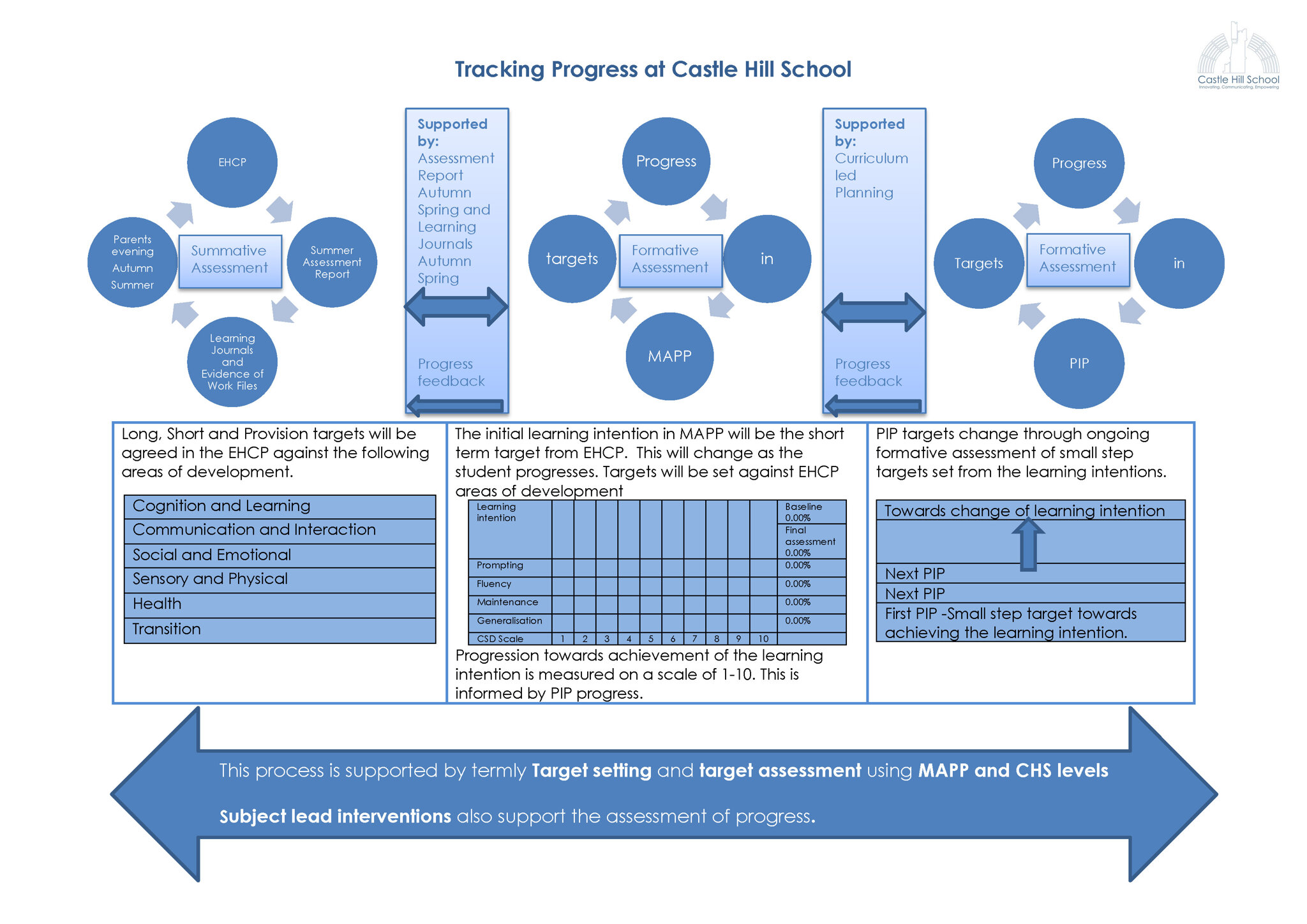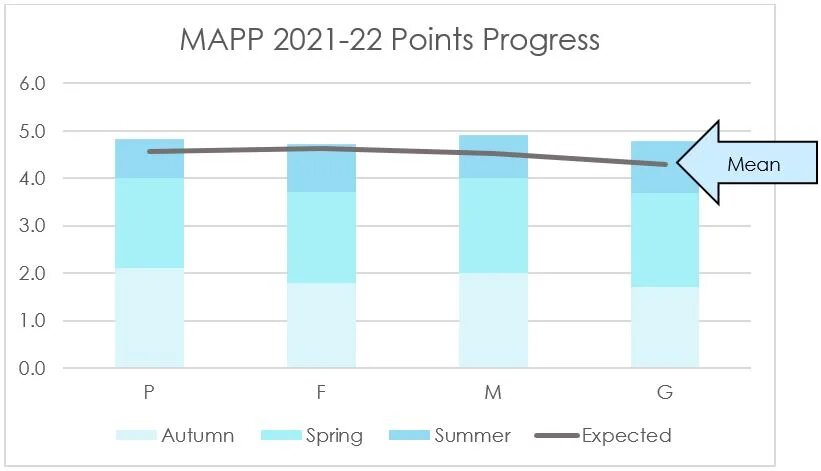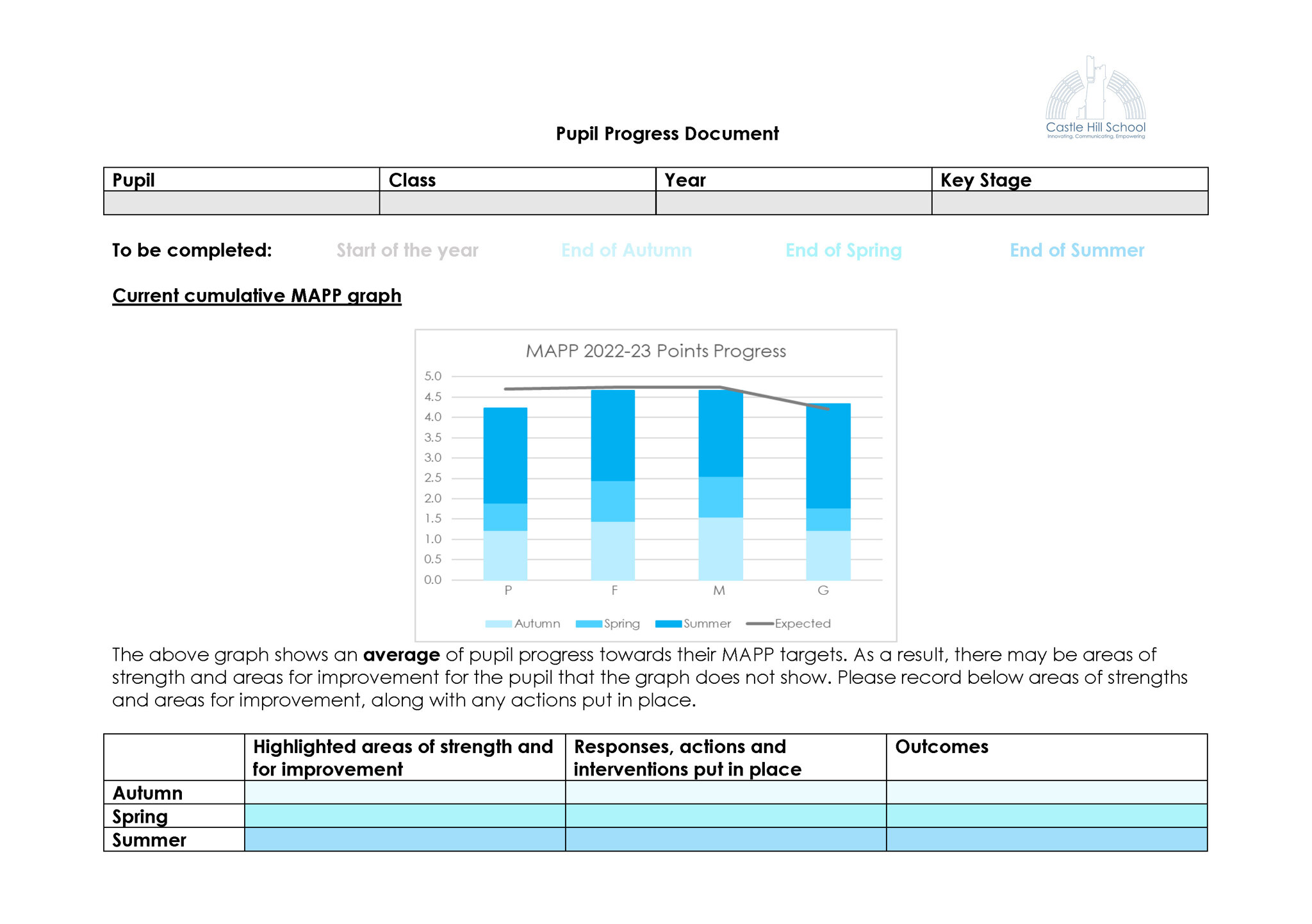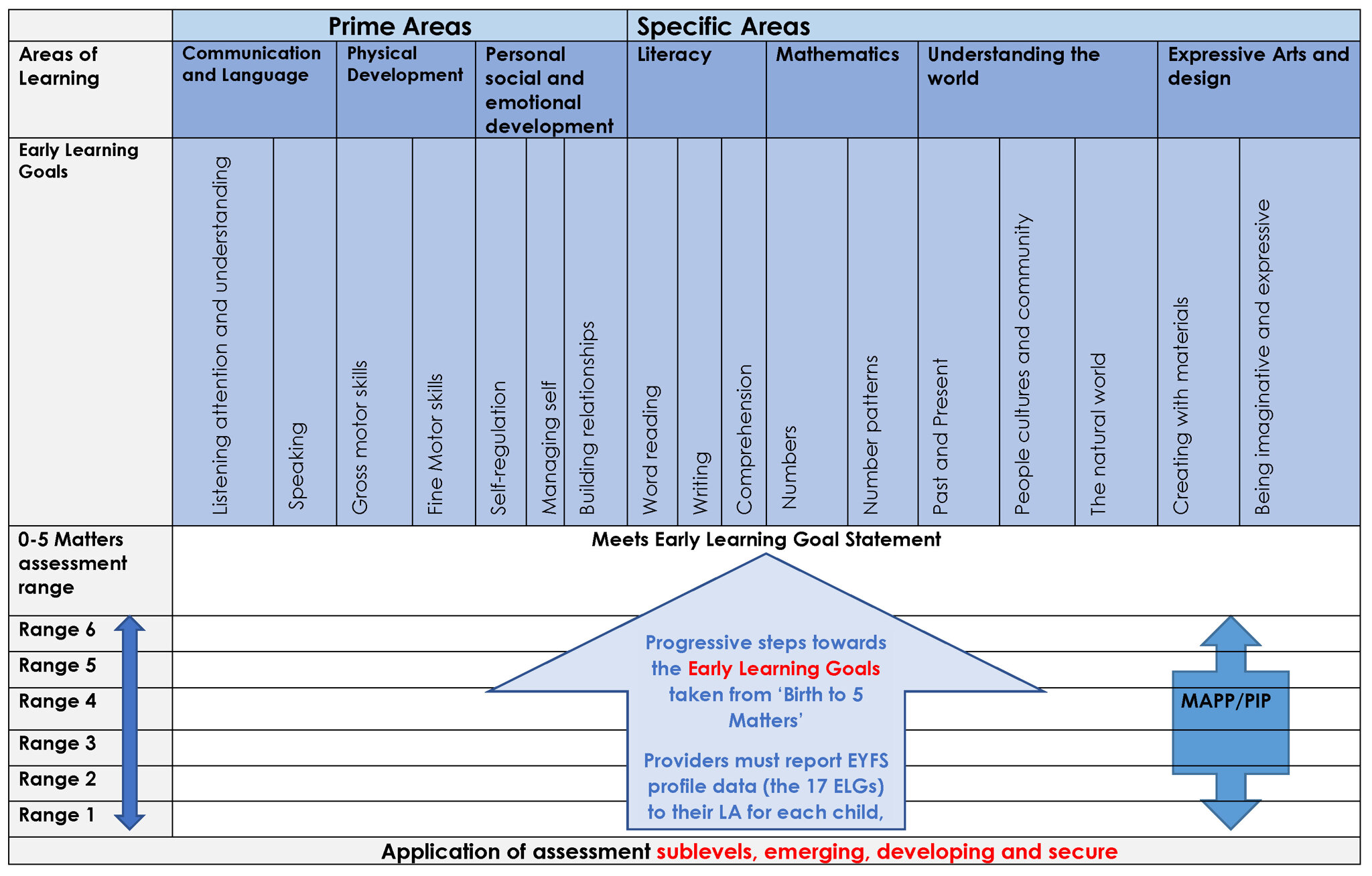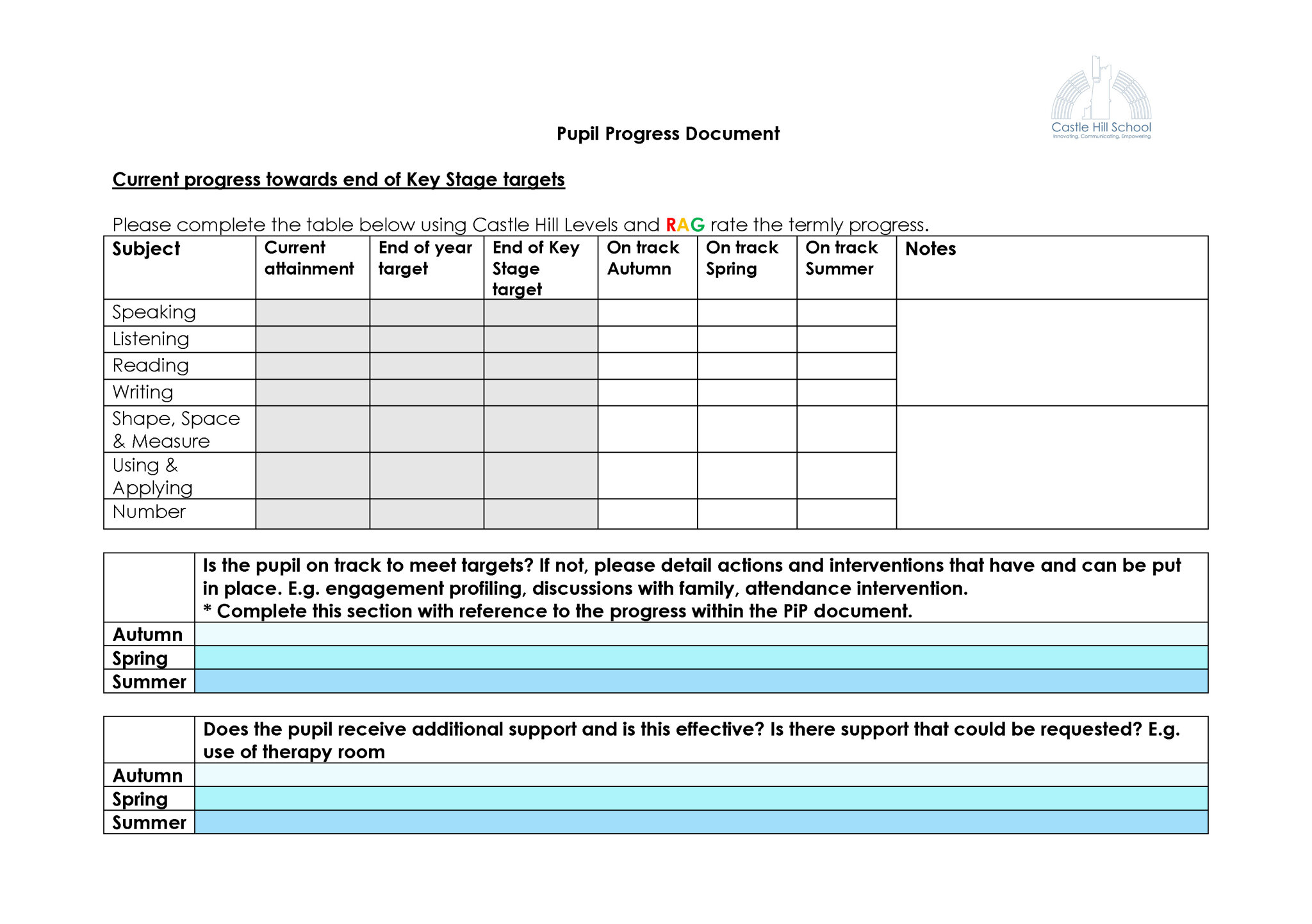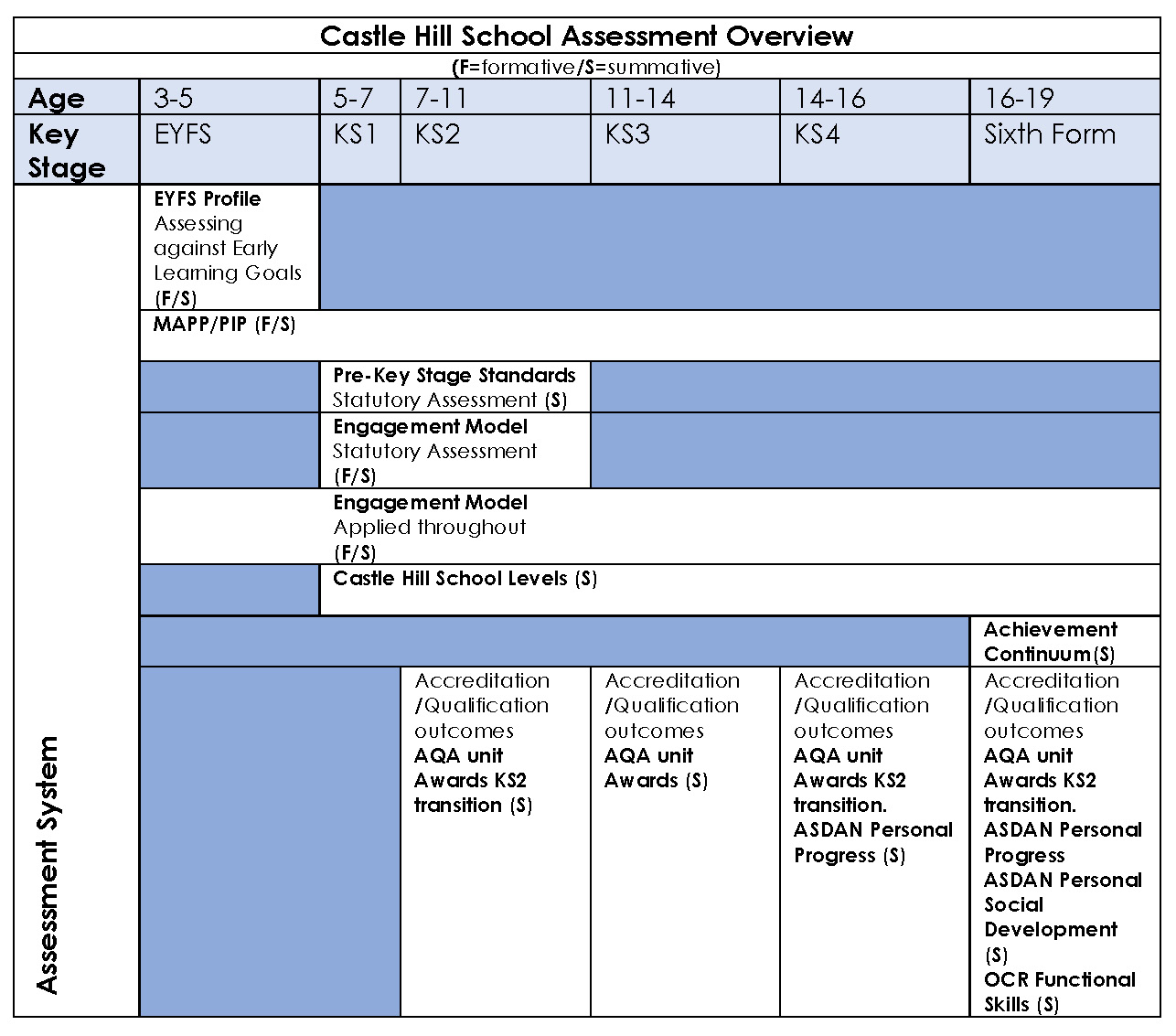Our assessment and planning cycle is shown below.
Assessment Reports: Please click here to access our assessment reports page.
Mapping and Assessing Personal Progress (MAPP):
MAPP is an assessment tool that has been developed to show small steps of progress. It assists in our formative and summative assessment process.
Short term/ provision targets taken from the Education Health Care Plans (EHCPs) are transferred to MAPP. Progress is then measured against 4 outcomes: Prompting, Fluency, Maintenance, and Generalisation on a scale of 1-10.
Within this process MAPP targets are also broken down into small Progress in Provision (PiP) steps which assist in evidencing progress. PiP targets are explicitly highlighted within the daily planning and evaluation documents.
MAPP grids do:
- Illustrate personalised learning pathways and progress.
- Illustrate steps of progress in personalised learning.
- When collated provide evidence of target change.
- Illustrate changes of progress from term to term.
MAPP grids do not:
Provide comparative data although, over time, an individual pupil’s data can be compared with their own past progress.
Each unit of progress along the MAPP 1-10 scale is given a value. The data is then converted into a MAPP Graph which to illustrates progress over time, usually a term. A mean average score for each group from previous years (SLD, PMLD, MSI…etc) also provides an estimated achievement expectation for the students.
The MAPP graphs produced provide a ‘broad brushstroke of performance’. They are used as an indicator of learning. They provide a focus for dialogue as to whether progress is being made. From these discussions actions and interventions can be agreed and applied.
MAPP graphs do:
Provide a focus for dialogue about progress.
Illustrate average rates of progression in personalised learning across all areas (Cognition & Learning, Communication & Interaction, Social & Emotional, Sensory & Physical, Transitions).
Provide a broad expectation of learning for individuals and groups of students to be compared against.
MAPP graphs do not:
Provide comparative data, although, over time, an individual pupil’s data can be compared with their own past progress.
Take into consideration the frequency of change in MAPP targets.
Illustrate changes in rates of progress within a term.
Termly individualised MAPP/PiP outcomes are analysed in professional discussion, as part of the ongoing assessment process. This ensures the SLT and teachers have a clear understanding as to the learning pathway for each pupil. Progress is recorded on each student’s Progress Towards Targets (PTT) record. MAPP Graphs are included on this document
Early Years Foundation Stage Assessment.
The Early Years Curriculum follows the Birth to 5 Matters Guidance and progress is assessed and reported against the 17 Early Learning Goals. Assessment is combined with whole school assessment systems (MAPP, PIP, Engagement Profile) to strengthen and confirm progress. Each developmental stage is divided into 3 sublevels, emerging, developing and secure.
NOTE: Using Birth to 5 Matters (2021), progress is tracked across developmental stages, categorised by ranges 1- 6. The application of the assessment range reflects Castle Hill School’s Child Centred approach to learning, recognising that each child’s learning Journey is unique and can reflect a linear and horizonal learning pathway. (Click here to visit our Curriculum page)
‘Children develop and learn at their own rates, and in their own ways. The guidance on possible development trajectories should not be taken as necessary steps, nor assumed to be in a particular order, for individual children’ (Birth to 5 Matters).
To personalise each student’s learning journey every student and their individual learning needs are rigorously assessed on entry to the school. The baseline assessments are undertaken against the non-statutory guidance (Birth to 5 Matters) and combined with professional knowledge of child development and individual needs (MAPP and PiP assessments).
Due to the needs of our pupils the vast majority are disapplied from the statutory reception baseline assessment process (RBA). (Click here to visit our Departments page)
Castle Hill School Levels:
Castle Hill School Level (CHSL) targets are set using professional judgements for each student for the end of each academic year and end of key stage. Students work towards these targets.
CHSL are used to assess Key Skill areas (English, Maths). Each CHSL has been broken down into 3 sub levels ‘c, b or a’ and relate to Emerging (c), Developing (b) and Secure skills (a). Baselines to measure against progress are completed in October and the final assessment is made in May/June. All assessments are based on the work completed throughout the year and professional teacher judgements. Teachers meet with a member of SLT on a termly basis to discuss individual progress and to set/review targets for the year. This information is collated in each student’s Progress Towards Targets (PTT) record. Progress made by all pupils can then be tracked year on year.
CHSL also allow us to measure the general progress of each Key Stage over the academic year and compare cohorts from pervious years. Please follow the link to our assessment reports. Assessment reports
Pre-Key Stage Standards:
From 2018-19 Pre-Key Stage Standards become a statutory assessment process for all pupils working below the expected National Curriculum level but above P4.
The Pre-Key Stage Standards are used to report progress at the end of Key Stage 1 & Key Stage 2 in Maths and English (reading and writing).
Moderation:
Moderation is essential to ensure that assessment and target setting at Castle Hill School is accurate and effective. We hold MAPP/PiP and CHSL moderation meetings on a half termly basis and cover all strands of English and Maths
Our website continues to showcase Pre-Key Stage standard moderation. Moderation
Please note: P level moderation is also available on our moderation page which relates directly to CHSLs.
Engagement Model:
We apply the Engagement Model assessment system for students at the early developmental stages of learning. The language of the 5 areas is integrated into our EHCP target setting and MAPP and PiP assessment process.
Our ‘PIP Target Vocabulary Bank’ provides examples as to how ‘Indicators of Engagement’ are integrated into our target setting and assessment processes.
For students at the early developmental stages of learning the Engagement Model is assessed in class through CHSL assessment 1-4, MAPP areas of learning and through Progress in Provision (PiP) targets.
The use of the Engagement Model is statutory from September 2021.
Engagement Profiling
Engagement Profiling is used to indicate what engagement looks like for individual pupils under each of the 5 areas of Engagement: Initiation, persistence, exploration, anticipation, realisation. The initial observations for Engagement Profiling should be completed when observing behaviours during high engagement activities.
The main purpose of engagement profiling is to support staff in finding the best strategies when working with pupils who can be hard to reach and engage. Staff observation including initial videos are made of the pupils working when they are highly engaged in order to identify the indicators of engagement and motivators. These are then applied to situations when there has previously been low engagement in order raise their overall engagement. Regular working parties are held for staff to discuss and moderate the process.
Achievement Continuum:
The Achievement Continuum (AC) is used to measure progress of Sixth Form students. The assessment scale runs from 1 -10, for each level we then subdivide them into thirds and award each sublevel with ‘c, b, a’ to demonstrate smaller steps of progress. The continuum has been merged with CHSL Levels to ensure that progress can be monitored throughout school. A baseline AC level is agreed for all students for English and Maths in October. The end of year assessment is completed in May. Target setting for all students takes place in November. Like CHSL the assessment information is recorded on Integris to enable year on year tracking of progress. Teachers in Sixth Form attend termly progress meetings with SLT to discuss the progress of each student towards their end of year target.
